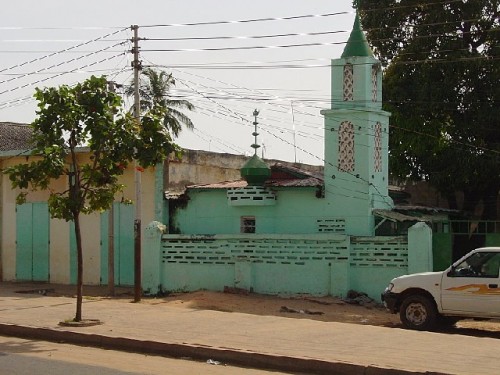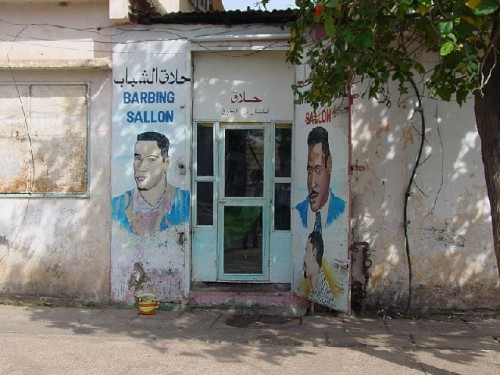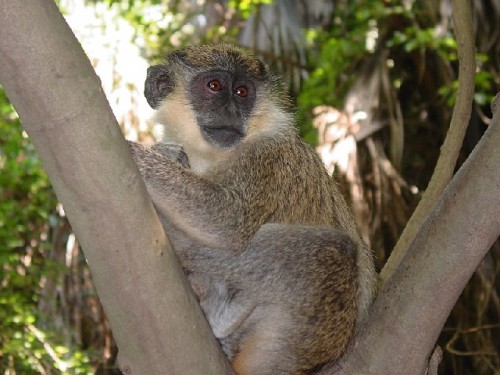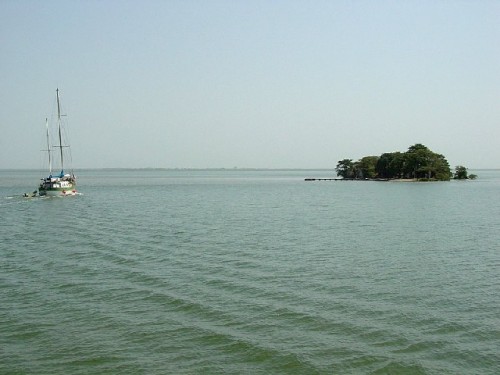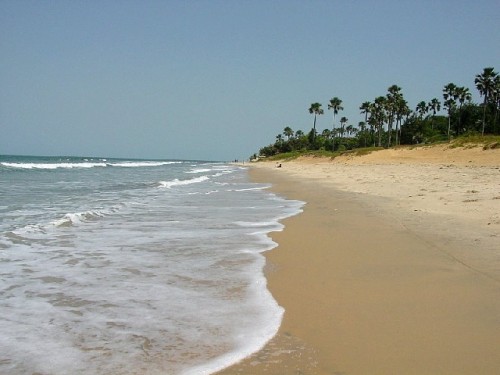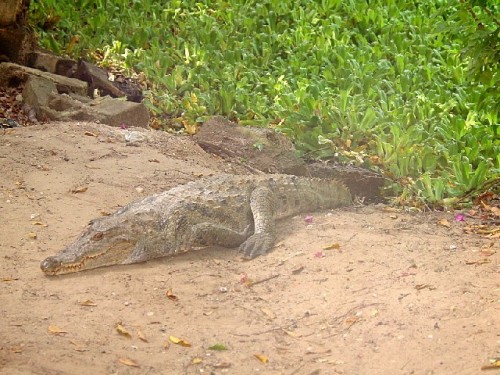Senegambia: Africa for Beginners? Part Three
An Eye-Opening Tour in West Africa
By: Szabolcs Mosonyi - Jan 08, 2008
The Gambia was supposed to be our get away from it all experience. It wasn't. While we did enjoy some beach time, we realized that what made us rather exhausted of Senegal holds true for Gambia as well. For all the differences, they are essentially the same country.
One risks wandering into sensitive territory with such a remark, but the facts speak for themselves. Senegal and Gambia are different only because of colonialism. With their sizeable Wolof and Mandinka populations, they are ethnically similar, just the proportions differ. Both countries are predominantly Muslim, have similar cuisine, music, flora and fauna and daily problems.
These similarities became evident the moment we arrived at the border crossing in Karang. Coming from Dakar, our cab dropped us off next to a ramshackle little hut with people relaxing outside. We couldn't see anything that came close to a border crossing so we started walking down the road, underneath a burning sun, cursing our cabbie for not taking us to the actual border and leaving us in the middle of nowhere.
Turns out we misjudged the guy. After about twenty minutes of walking loaded with heavy backpacks, our cab stopped next to us, telling us to get in and go back with him to the border checkpoint. What checkpoint? The little hut he had dropped us off at. Having heard numerous stories of African border officials, we weren't amused. Expecting the worst for our "illegal crossing", from a hefty fine ,or bribe, to possible criminal prosecution. With some trepidation we headed back to the nondescript checkpoint. Fortunately, the officer was an easy-going fellow with no intention of threatening us. He did give us a hard look at first, but we ended up having a casual conversation. He stamped our passports to exit Senegal and we were on our way.
Next stop: A similarly ramshackle building on the Gambian side. Here too the atmosphere was quite relaxed, the only difference being a holding cell in the middle of the room with two inmates napping peacefully. What kept me from snapping some photos was the fear that, if noticed, I might have to join them.
So there we were in Gambia.
No sooner did we step out of the customs building than touts overran us. "Sir, you want taxi? Sir, you want Dalasi?" Having neither a car, nor the local currency, we entered into negotiations. We parted with some CFA Franc, which is like the Euro of West Africa and got some Gambian Dalasi at a really questionable exchange rate. At least the money wasn't fake.
Next thing was the cab. With only one vehicle there, our cabbie took perfect advantage of his monopolistic situation. Even though five bystanders were needed to push-start his car, he felt no shame charging an exorbitant fare.
He took us through tiny villages, where we often shared the road with herds of goats and cattle. Eventually, we wound up at what looked like a busy market. This was supposed to be the ferry terminal, but it certainly didn't look like one. Then, instead of leaving us to figure out where to go, our cabbie took us through the maze of stalls to a tiny ticket office we surely would not have found . With a well deserved tip he was off and we were on our way.
We sat down in the waiting room knowing the ferry would come "soon", whatever that means. There were just a few women with huge bags. For the first time in a long while, we had a few minutes to talk to each other. Then came two guys about our age and sat down next to us. We tried to bet on how long it would take for them to strike up a conversation, but were immediately interrupted by the oh-so-familiar "Hello my friendÂ…" I don't need to tell you about the rest of the ferry trip.
Having made it to Banjul, the capital of the smallest country in Africa, at first glance, it was a contender for the title of "most unfriendly city we've seen." That distinction, for us, was previously held by Dakar. We were glad to be leaving and headed for the coastal town of Fajarah. There, tucked away in a small alley, we found an oasis of peace, Safari Garden Hotel. A pleasant little place run by a nice British couple. It has landscaped grounds, clean rooms, and a nice pool. Their local staff was polite and happy to engage in conversation with us without any ulterior motive.
Having recharged our batteries, we hit the road again, exploring Western Gambia during several daytrips. First, we ventured back to Banjul and found that it wasn't so unpleasant after all. While I'm fairly certain it will never be a tourist hotspot, we had a nice stroll on its quaint streets, spotting the occasional remnants of British colonialism.
What made Gambia memorable was our encounter with nature after an all too urban tour. Gambia boasts two tiny, but great, nature reserves near the coast, Abuko, and Bijilo. After the flat, savannah-like grassland that dominated much of Senegal, their lush subtropical scenery offered a welcome change. We wandered well signposted trails where we could catch a glimpse of local flora and fauna, spotting crocodiles, monkeys, baboons, hyenas, a plethora of birds, and some enormous spiders (much to my dismay).
Another excellent place to view wildlife up close is the bizarre Kachikaly Pool. This is a small, sacred site for local people, featuring a circular pool that is the home of about 70 crocodiles. Bathing in it is believed to bring luck and fertility (and maybe a few lost limbs). The crocs also roam freely about outside the pool, but fortunately didn't show much interest in biting us in half.
A fascinating tour introduced us to the darker chapters of Gambian history. We took a cruise down the Gambia River sailing among playful dolphins to a tiny and unassuming village called Jufureh. Had Alex Haley not written Roots, nobody would now about this place, but Kunta Kinte put the village on the map.
The accuracy of available historical records is dubious, at best, but Jufureh claims to be the place where Kunta Kinte was born and where he was captured and taken to America. If that is the case, he was probably shipped through nearby James Island with the ruins of a 17th century British fort. It was once a major hub of the Gambian slave trade.
While virtually nothing remains of the actual buildings, it is still bizarre how a tiny island in this quaint region was once a place of terror and tears. The only reminder today is a museum near Jufureh with exhibits of the slave trade, including drawings of how people were crammed in the hold of ships for the notorious "middle passage."
Our last day was spent enjoying the beach, avoiding the hustlers and chilling by the pool with a bottle of Julbrew, a great local beer. We had very mixed feelings of our whole African experience and I probably would have bet good money that we would not be heading back soon. Some months on, I am no longer so sure that we will not be lured back by such exotic adventures.
Many who read the first two parts of my account have told me it sounded negative. The friends who accompanied me, however, suggest that my coverage is deceptively positive. Perhaps it is, because it was such a memorable trip and, in that sense, certainly worth it.
There really were a lot of challenges to face. The lack of competition keeps prices ridiculously high, everything is shabby and dusty, and I don't think I need to say more about the ubiquitous hustlers.
On the positive side we were rewarded with pristine beaches, lots of history, delicious food, and an insight into two countries struggling to make progress but free of the conflicts that plague so many other African nations. Both Senegal and Gambia have great potential and let us keep our fingers crossed for them to make the most of it. Yes, I will be back. Some day. For another great African adventure.


